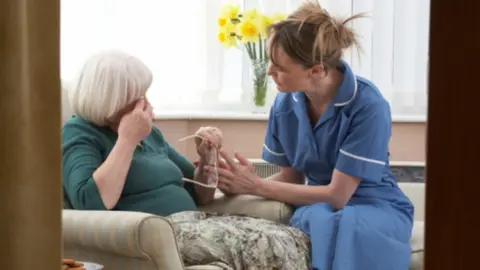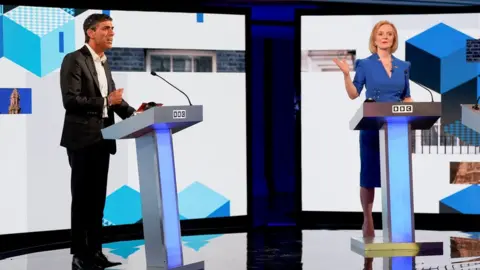MPs vote to scrap health and social care tax rise
 Getty Images
Getty ImagesMPs have voted in favour of scrapping a tax rise introduced to fund the NHS and social care.
Treasury Minister Chris Philp defended the move, arguing that it was important to "urgently alleviate the tax burden" given the cost-of-living crisis.
Labour supported the change and criticised ministers for introducing the levy in the first place.
However, some MPs questioned how the government would fill any shortfall left by reversing the tax rise.
Mr Philp insisted that although the increase - which had been expected to raise £12bn a year - was being reversed, funding for health and social care would be "unaltered".
"Not a single penny less will go to social care or the NHS," he added.
Former Conservative minister James Cartlidge asked if the gap would be filled by borrowing "or some other change".
Mr Philp replied that this would be set out by Chancellor Kwasi Kwarteng on 31 October when he delivers his economic plan to MPs.
Labour shadow Treasury minister James Murray said his party welcomed the government "finally admitting they were wrong to raise national insurance on working people and businesses in the middle of a cost-of-living crisis".
Following a debate, the bill cleared the Commons after receiving an unopposed third reading.
Before it comes into effect, the reversal also needs to be approved in the House of Lords - this is expected to happen on 17 October.
 Reuters
ReutersUnder the original plan introduced by the government in April, National Insurance was increased by 1.25p in the pound.
From April 2023, the extra tax was to have been collected as the new Health and Social Care Levy.
The money raised was intended to go firstly towards helping the NHS tackle backlogs after Covid, then to fund social care.
Raising the tax broke a Conservative manifesto promise, but then-Prime Minister Boris Johnson said it was needed help to deal with the "catastrophic costs" faced by those who need care.
The Treasury has said dropping the tax rise would save nearly 28 million people an average of £330 per year, while 920,000 firms would get a tax reduction of nearly £10,000.
